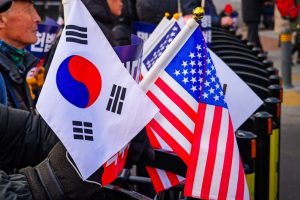US tech giant Nvidia plans to release a new less powerful version of its H20 artificial intelligence chip for China in the next two months, sources say.
The chipmaker has told major customers in China, such as cloud computing providers, it will release a modified AI chip in July following US export restrictions on the original model, sources told Reuters.
The downgraded H20 represents Nvidia’s latest attempt to maintain its presence in one of its most crucial markets in the face of Washington’s expanding efforts to restrict China’s access to advanced semiconductor technology.
ALSO SEE: Fear of Huge Job Losses Led to China’s Move to Discuss Tariffs
The H20, which had been Nvidia’s most powerful AI chip cleared for Chinese sales, was effectively blocked from the market after Trump Administration officials informed the company last month that the product would require an export licence.
Memory capacity to be reduced
Nvidia has formulated new technical thresholds, which will guide the development of the modified chip designs. These specifications will result in significant downgrades from the original H20, including substantially reduced memory capacity, one of the sources said.
Another of the sources said downstream customers could potentially modify the module configuration to adjust the chip’s performance levels.
Nvidia declined to comment. The US Commerce Department did not immediately respond to a request for comment.
China accounted for $17 billion in revenue, or 13% of Nvidia’s total sales, in the fiscal year ended January 26.
Highlighting the country’s strategic importance, Nvidia CEO Jensen Huang visited Beijing last month, just days after US officials announced the new export licence requirements for the H20 chip.
During meetings with Chinese officials, Huang emphasised China’s significance as a key market for the company.
The US has restricted exports of Nvidia’s most sophisticated chips to China since 2022, citing concerns about their potential military applications.
The H20 was introduced after Washington tightened export controls in October 2023.
Chinese technology giants including Tencent, Alibaba and ByteDance, TikTok’s parent company, stepped up H20 chip orders amid growing demand for cost-effective AI models from companies such as startup DeepSeek, Reuters reported early this year.
Nvidia had accumulated $18 billion worth of H20 orders since January, according to a Reuters report last month.
- Reuters with additional editing by Jim Pollard
ALSO SEE:
US to Rejig Export Curbs for AI Chips, ‘Shift to Licensing Deals’
US Lawmakers Push Location-Tracking For High Powered AI Chips
Satellite Images Show Huawei’s Expanding Chip Facilities – FT
Nvidia and China Tech Giants Hit by Latest US Chip Clampdown
Tariffs on Imported Chips to be Announced Soon, Trump Says
China Tech Giants ‘Ordered $16 Billion of New Nvidia Chips’
Server Fraud Case in Singapore May be Linked to AI Chips, China
China Tech Giants Lift Nvidia Chip Orders Amid Trump Curbs Talk
All Eyes on Nvidia Chips Demand Amid Doubts on AI Outlays
DeepSeek Breakthrough or Theft? US Probes ‘AI Data Breach’
‘AI Breakthrough’ by China’s DeepSeek Rocks US Tech Giants
Bytedance ‘Plans $20 Billion Outlay on AI Infrastructure This Year’
China’s Huawei ‘Hoping Its New AI Chip Can Outpower Nvidia’
























